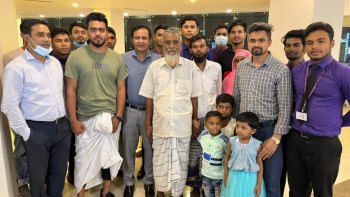Farooki's ‘Saturday Afternoon’ and our obsession with image

Bangladesh is strapped to a strange bandwagon. What is this bandwagon, you ask? It's the bandwagon of "image." This particular bandwagon needs dirt roads to be driven on. That's why our once-glorious, "paved" cultural arena has turned into dirt roads – to make way for this bandwagon. You can't stray from this path, thanks to the different quarters that lurk around us.
If one or two defiant filmmakers try to pave their own ways out of the dirt, our censor board loses no time in showing them their place. That's exactly what has happened with the film Saturday Afternoon, written and directed by Mostofa Sarwar Farooki.
Farooki would be the foremost among the few local filmmakers who are currently making their mark and bearing the country's flag on a global stage. Not even his worst enemy would say that any of his past films have put the country's freedom, sovereignty, or security at any risk. On the contrary, the diverse narratives of his films have made the world see Bangladesh in a new light.

Yet, his films have repeatedly been subjected to a maze of obstacles in the name of censorship. Why is that? My guess is that it's meant to teach us all a lesson. By obstructing Farooki's film, the "powers that be" want to warn everyone else of the dangers of thinking differently, of creating alternate narratives with cinema; they want to discourage new voices from giving rise to new slogans. This is why Saturday Afternoon has been kept waiting in the censor board's waiting room for more than three and a half years.
We say with pride that we are now "Digital Bangladesh." Yet, we have not realised the fact that our censor board is a relic of the past. Film certification is the standard followed around the world today. A "film certification board" certifies movies for different age groups, and based on that certification, the audience decides which movie they want to watch by themselves, which one they'd rather watch with a friend, and which with their families. This shift has happened globally because censorship has no place in art. Art is meant to flow freely. The decision to either go with the flow or to stand idly on the shore and stare at the water is entirely up to the viewer.
The censor board infringes on the freedom of the artiste and the audience in equal parts. Let alone the artiste, the audience's collective intelligence is insulted when, instead of trusting their judgement, a few members of the censor board decide, at their own discretion, whether to let a film pass or fail. In most cases, their weapon of choice is the phrase "tarnish the image." And that weapon has been deployed once more for Saturday Afternoon.
Laundering billions of taka abroad does not tarnish Bangladesh's image, extrajudicial killings don't tarnish Bangladesh's image, the news of detaining artistes and releasing them upon signing a bond does not tarnish Bangladesh's image either. Yet, the release of a film based on true events, made with artistes and producers from here and abroad, is supposed to tarnish Bangladesh's image?
The injustice that is being done to Saturday Afternoon is unprecedented. Once a film is submitted, the censor board must file a report within 15 days. If the producer and director are not satisfied with the report, they can appeal to the censor board. If the result of the appeal is not in favour either, they can go to the court. But even though there is a 15-day deadline for the censor board, the appeal board is not bound by any similar deadline.
This is the loophole that is being exploited to keep this film locked away for three and a half years now. Officials have come and gone during this time, but the fate of this film remains hanging in the balance. Freedom of thought and conscience is guaranteed under Section 39 (1) of the Constitution of the People's Republic of Bangladesh. The state and the government should be responsible for ensuring this freedom, not infringe upon it. It's the right of a filmmaker to make a film as they want, and similarly, the viewer has a right to either accept or reject it. The state, the government, the police or the censor board has no right to place themselves in the middle of this process. It is unconstitutional for them to do so. But the reality is such that we are having to come to terms with this.
We are not allowed to make films about the hill tracts; we are not allowed to make films about government or private sector corruption. We can't even make films that capture the injustices that ordinary people face from day to day. Why? Because someone sitting on the censor board may be thinking, "I can't kill your art with weapons, but I can kill it with censorship." This is injustice. The imposition of censorship in an independent country is a clear violation of what art stands for.
It didn't matter if, in 1971, the songs of Swadhin Bangla Betar Kendra were accused of tarnishing the image of the Pakistani ruling class – those songs today are our national treasure. Today, we are an independent country, a free nation. We make our own decisions now. We have shown the world how quickly we are leveraging our manpower in the race to graduate from a developing country to one that is developed.
Let us make the decision of whether Saturday Afternoon makes us laugh or cry. Let us decide whether it tarnishes our image – or the lack of an image. History has proven that this nation cannot be shackled by force. Therefore, we demand the immediate release of Saturday Afternoon, and the abolishment of censorship in art.
Translated from Bangla by Azmin Azran.
Ashfaque Nipun is a filmmaker.

 For all latest news, follow The Daily Star's Google News channel.
For all latest news, follow The Daily Star's Google News channel. 







Comments